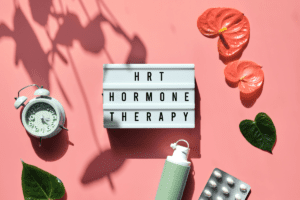
Meal Timing for Workouts: Fueling Your Body in Perimenopause
The days of fasted cardio and fasted exercise are behind us—especially for women in perimenopause and menopause. While these trends may have seemed beneficial in
If you are a woman who struggles with sleep and has given up, DON’T. Getting a good night’s rest has dramatic impacts on your hormones and well-being. Burning the midnight oil, drinking wine before bed to “wind down,” skipping meals or eating a large meal before bedtime, stress, and more are all deleterious to a woman’s health. And if you are a woman who is struggling to lose weight and you aren’t getting enough quality sleep, fixing that is step number one!
Sleep and women’s hormones are intricately connected. Hormonal changes that occur during the menstrual cycle, pregnancy, and menopause can have a significant impact on a woman’s sleep patterns and quality of sleep.
It’s important for women to prioritize good sleep hygiene and self-care practices to support their overall sleep health. Here are some tips:
Understanding the relationship between hormones and sleep can help women navigate the changes that occur during different stages of life and make informed decisions to improve their sleep quality.
For my recommendations for supplements to support sleep, check out the protocol I created in FullScript here and get 30% off your order.
If you are struggling with your hormones and sleep, I can help! I am a nurse practitioner with a Doctorate in Nursing Practice in WA state. I use an Integrative Medicine approach to women’s health and hormone optimization from pre-, peri-, to post-menopause.
“When women take care of their health, they become their own best friend.” – Maya Angelou

The days of fasted cardio and fasted exercise are behind us—especially for women in perimenopause and menopause. While these trends may have seemed beneficial in

If you’ve ever been told “your labs are normal” while feeling anything but… this one’s for you. For millions of women in perimenopause and menopause,

Sleep apnea, a common yet often underdiagnosed sleep disorder, becomes a significant health concern for women entering their 40s and beyond. During the perimenopausal transition,